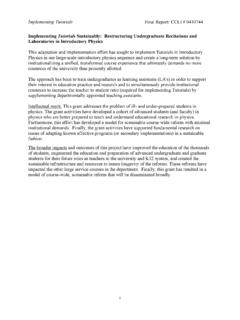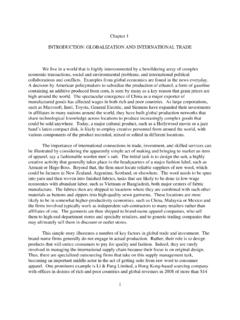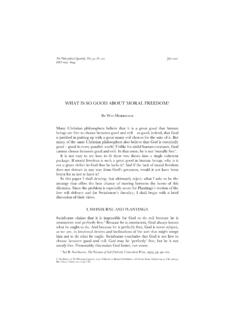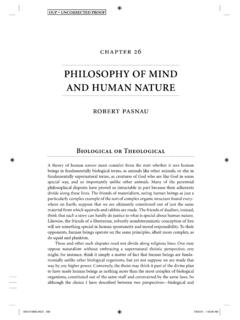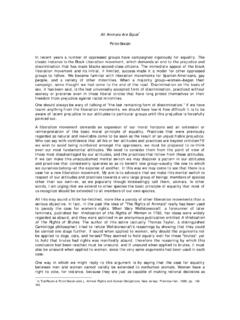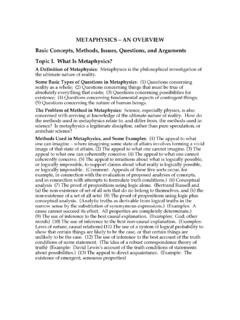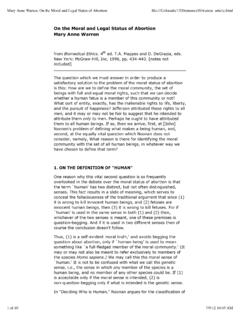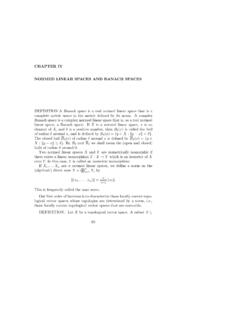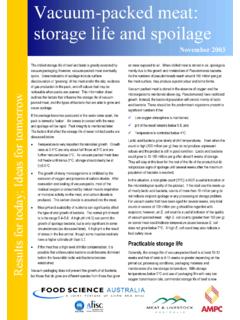Transcription of Alastair Norcross Rice University
1 PUPPIES, PIGS, AND PEOPLE: EATING MEAT ANDMARGINAL CASESA lastair NorcrossRice University1. Fred s BasementConsider the story of Fred, who receives a visit from the police one have been summoned by Fred s neighbors, who have been disturbed bystrange sounds emanating from Fred s basement. When they enter the basementthey are confronted by the following scene: Twenty-six small wire cages, eachcontaining a puppy, some whining, some whimpering, some howling. Thepuppies range in age from newborn to about six months. Many of them showsigns of mutilation. Urine and feces cover the bottoms of the cages and thebasement floor. Fred explains that he keeps the puppies for twenty-six weeks,and then butchers them while holding them upside-down. During their lives heperforms a series of mutilations on them, such as slicing off their noses and theirpaws with a hot knife, all without any form of anesthesia.
2 Except for themutilations, the puppies are never allowed out of the cages, which are barelybig enough to hold them at twenty-six weeks. The police are horrified, andpromptly charge Fred with animal abuse. As details of the case are publicized,the public is outraged. Newspapers are flooded with letters demanding that Fredbe severely punished. There are calls for more severe penalties for animal is denounced as a vile , at his trial, Fred explains his behavior, and argues that he isblameless and therefore deserves no punishment. He is, he explains, a greatlover of chocolate. A couple of years ago, he was involved in a car accident,which resulted in some head trauma. Upon his release from hospital, havingapparently suffered no lasting ill effects, he visited his favorite restaurant andordered their famous rich dark chocolate mousse.
3 Imagine his dismay when hediscovered that his experience of the mousse was a pale shadow of its formerself. The mousse tasted bland, slightly pleasant, but with none of the intensechocolaty flavor he remembered so well. The waiter assured him that the recipewas unchanged from the last time he had tasted it, just the day before hisPhilosophical Perspectives, 18, Ethics, 2004accident. In some consternation, Fred rushed out to buy a bar of his favoriteBelgian chocolate. Again, he was dismayed to discover that his experience of thechocolate was barely even pleasurable. Extensive investigation revealed that hisexperience of other foods remained unaffected, but chocolate, in all its forms,now tasted bland and insipid. Desperate for a solution to his problem, Fredvisited a renowned gustatory neurologist, Dr.
4 T. Bud. Extensive tests revealedthat the accident had irreparably damaged the godiva gland, which secretescocoamone, the hormone responsible for the experience of chocolate. Fredurgently requested hormone replacement therapy. Dr. Bud informed him that,until recently, there had been no known source of cocoamone, other than thehuman godiva gland, and that it was impossible to collect cocoamone from oneperson to be used by another. However, a chance discovery had altered thesituation. A forensic veterinary surgeon, performing an autopsy on a severelyabused puppy, had discovered high concentrations of cocoamone in the puppy sbrain. It turned out that puppies, who don t normally produce cocoamone,could be stimulated to do so by extended periods of severe stress and research, which led to this discovery, while gaining tenure for its authors,had not been widely publicized, for fear of antagonizing animal welfare this research clearly gave Fred the hope of tasting chocolate again,there were no commercially available sources of puppy-derived cocoamone.
5 Lackof demand, combined with fear of bad publicity, had deterred drug companiesfrom getting into the puppy torturing business. Fred appeals to the court toimagine his anguish, on discovering that a solution to his severe deprivationwas possible, but not readily available. But he wasn t inclined to sit aroundbemoaning his cruel fate. He did what any chocolate lover would do. He readthe research, and set up his own cocoamone collection lab in his basement. Sixmonths of intense puppy suffering, followed by a brutal death, produced enoughcocoamone to last him a week, hence the twenty-six cages. He isn t a sadist or ananimal abuser, he explains. If there were a method of collecting cocoamonewithout torturing puppies, he would gladly employ it. He derives no pleasurefrom the suffering of the puppies itself.
6 He sympathizes with those who arehorrified by the pain and misery of the animals, but the court must realize thathuman pleasure is at stake. The puppies, while undeniably cute, are mere admits that he would be just as healthy without chocolate, if not more so. Butthis isn t a matter of survival or health. His life would be unacceptably impover-ished without the experience of of story. Clearly, we are horrified by Fred s behavior, and unconvincedby his attempted justification. It is, of course, unfortunate for Fred that he canno longer enjoy the taste of chocolate, but that in no way excuses the impositionof severe suffering on the puppies. I expect near universal agreement with thisclaim (the exceptions being those who are either inhumanly callous or thinkingahead, and wish to avoid the following conclusion, to which such agreementcommits them).
7 No decent person would even contemplate torturing puppiesmerely to enhance a gustatory experience. However, billions of animals endure230 / Alastair Norcrossintense suffering every year for precisely this end. Most of the chicken, veal,beef, and pork consumed in the US comes from intensive confinement facilities,in which the animals live cramped, stress-filled lives and endure unanaesthetizedmutilations1. The vast majority of people would suffer no ill health from theelimination of meat from their diets. Quite the reverse. The supposed benefitsfrom this system of factory farming, apart from the profits accruing to agribusi-ness, are increased levels of gustatory pleasure for those who claim that theycouldn t enjoy a meat-free diet as much as their current meat-filled diets. If weare prepared to condemn Fred for torturing puppies merely to enhance hisgustatory experiences, shouldn t we similarly condemn the millions who pur-chase and consume factory-raised meat?
8 Are there any morally significantdifferences between Fred s behavior and their behavior?2. Fred s Behavior Compared with Our BehaviorThe first difference that might seem to be relevant is that Fred tortures thepuppies himself, whereas most Americans consume meat that comes fromanimals that have been tortured by others. But is this really relevant? What ifFred had been squeamish and had employed someone else to torture the puppiesand extract the cocoamone? Would we have thought any better of Fred? Ofcourse difference between Fred and many consumers of factory-raisedmeat is that many, perhaps most, such consumers are unaware of the treatmentof the animals, before they appear in neatly wrapped packages on supermarketshelves. Perhaps I should moderate my challenge, then. If we are prepared tocondemn Fred for torturing puppies merely to enhance his gustatory experi-ences, shouldn t we similarly condemn those who purchase and consumefactory-raised meat, in full, or even partial, awareness of the suffering enduredby the animals?
9 While many consumers are still blissfully ignorant of theappalling treatment meted out to meat, that number is rapidly dwindling, thanksto vigorous publicity campaigns waged by animal welfare groups. Furthermore,any meat-eating readers of this article are now deprived of the excuse a consumer of factory-raised animals could argue as follows: WhileI agree that Fred s behavior is abominable, mine is crucially different. If Freddid not consume his chocolate, he would not raise and torture puppies (or paysomeone else to do so). Therefore Fred could prevent the suffering of thepuppies. However, if I did not buy and consume factory-raised meat, no animalswould be spared lives of misery. Agribusiness is much too large to respond tothe behavior of one consumer. Therefore I cannot prevent the suffering of anyanimals.
10 I may well regret the suffering inflicted on animals for the sake ofhuman enjoyment. I may even agree that the human enjoyment doesn t justifythe suffering. However, since the animals will suffer no matter what I do, I mayas well enjoy the taste of their , Pigs, and People /231 There are at least two lines of response to this attempted defense. First,consider an analogous case. You visit a friend in an exotic location, sayAlabama. Your friend takes you out to eat at the finest restaurant in Tusca-loosa. For dessert you select the house specialty, Chocolate Mousse a`laBama , served with a small cup of coffee, which you are instructed to drinkbefore eating the mousse. The mousse is quite simply the most delicious dessertyou have ever tasted. Never before has chocolate tasted so rich and to order a second, you ask your friend what makes this mousse sodelicious.
